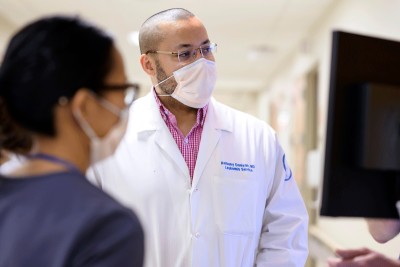
The standard treatments for acute myeloid leukemia (AML) include chemotherapy and stem cell transplant, also called a bone marrow transplant. Radiation therapy is sometimes used as well.
Radiation therapy uses high-energy rays to destroy cancer cells. It is an especially likely option when treating AML in the brain or other parts of the nervous system. Radiation therapy may also be given in preparation for a stem cell transplant.
Doctors at Memorial Sloan Kettering consider a number of factors when recommending treatment. These can include any chromosome changes or gene mutations in the cancer, age, and other current health problems.
Treatment for AML is typically divided into two phases: remission induction therapy and postremission therapy. Older adults, especially those with other health problems, may receive less-intensive treatment than younger adults.
Our experts can often provide a same-day appointment for patients with newly diagnosed acute myeloid leukemia (AML). Call 646-497-9154 to make an appointment.
The goal of the remission induction phase is to bring on a remission. In this state, there is no visible evidence of cancer and blood counts are normal. Most people take two drugs during this phase: cytarabine (Cytosar-U®) and daunorubicin (Cerubidine®) or idarubicin (Idamycin® PFS).
In postremission therapy, people are treated to eliminate any remaining leukemia cells. This may consist of cytarabine given alone in higher doses.
Some people with AML undergo either an autologous transplant or an allogeneic transplant. An autologous transplant uses a patient’s own blood stem cells, and an allogeneic transplant uses blood or marrow stem cells donated by someone else.
Learn more about blood and marrow stem cell transplantation.
AML That Spreads to the Brain and Nervous System
In rare instances, AML can spread to the brain or other parts of the nervous system. MSK’s doctors are experienced in preventing cancer from spreading to these areas and controlling it when it does. We may recommend giving chemotherapy directly into the fluid that surrounds the spinal cord and brain. This process is called intrathecal chemotherapy. People with AML may receive high-dose chemotherapy through an IV or radiation therapy to the head (called cranial irradiation) to prevent the disease from spreading to the central nervous system.
Clinical Trials
You may have the opportunity to participate in a clinical trial. These studies investigate new approaches to killing tumor cells directly, inhibiting the body’s production of substances that promote their growth, or enhancing the immune response against leukemia cells. See a listing of our clinical trials for leukemia.
MSK researchers are conducting clinical trials targeting specific genetic mutations or chromosomal abnormalities commonly found in AML. These genes include FLT3, IDH1, IDH2, and MLL. Targeted therapies often have fewer side effects than conventional chemotherapy drugs. They may also cause remission in people whose cancer has come back after chemotherapy or has stopped responding to chemotherapy. We are looking at combining targeted therapies with regular chemotherapy to improve treatment from the beginning.
MSK doctors are studying new chemotherapy drugs that may be better at killing leukemia cells or have more effective delivery to leukemia cells.
Monoclonal antibodies are genetically engineered proteins designed to target specific sites called antigens. Antigens are located on the surface of tumor cells. Monoclonal antibodies stimulate the normal immune system to destroy cancer cells or block key actions that cancer cells need to survive. MSK researchers pioneered this approach for the treatment of AML.
Additionally, monoclonal antibodies can deliver a radioactive substance, chemotherapy, or a toxin to a cancer cell.
Researchers at MSK are evaluating vaccines made from protein pieces (peptides) found on AML cells. The immune system recognizes these peptides as abnormal. The studies will see if the vaccines can trigger an immune response in people with AML and other types of cancer that contain the abnormal protein.







